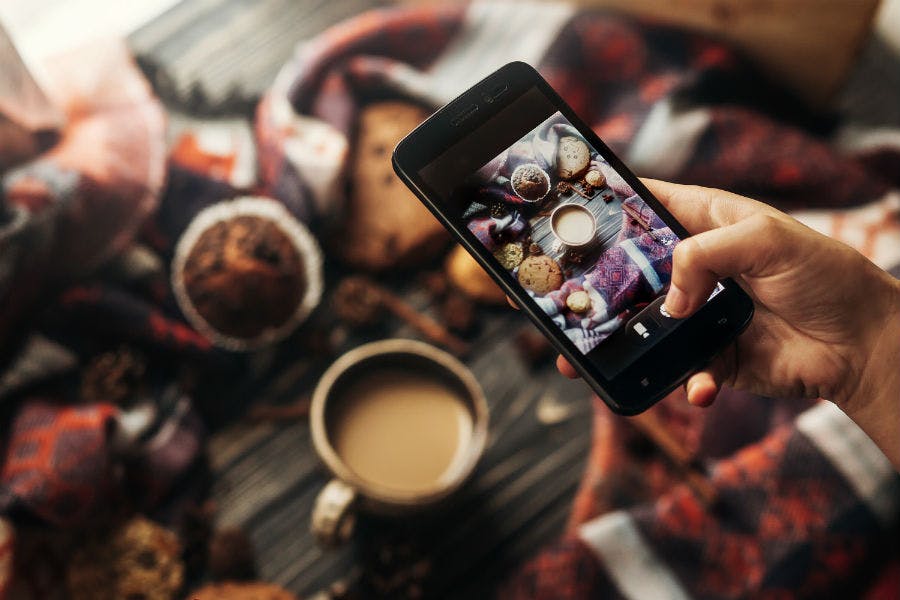Have you ever found yourself deep in the Facebook photo albums of a total stranger?
It’s not as uncommon as you might think. Facebook stalking, whether you know the person or not, is a known phenomenon that has emerged over the past decade.
A handful of Facebook users interviewed for this article recently shared their own guilty pleasures. While many of us might admit to checking out the behaviour of an ex-boyfriend online or an old schoolmate we’re curious about, how many of us would confess to social media stalking a stranger? Yet it seems that many people do exactly that.
Many of us follow people's lives on Facebook or on other social media platforms without even knowing them. These aren’t necessarily celebrities, but maybe other individuals whom we have made a habit of checking in on periodically. It could be someone we have a random connection with (through mutual friends, living in the same town, etc), or it could be a person whose profile we happened to stumble across. For whatever reason, something about this individual’s life fascinates us and we keep on watching.
Like a Car Wreck
Being interested in the lives of other people is nothing new. We’ve been gossiping about neighbours since the dawn of time, and as celebrities and famous individuals emerged, society grew increasingly obsessed with following their every move.
No, our interest in other humans is not a novel pastime; the world of social media has simply made people’s everyday activities far more accessible. It has also made it much easier to remain anonymously hidden in the shadows. The barrier of the screen offers a sense of protection.
Perhaps you haven’t spoken to a certain Facebook friend in years, but you keep them around simply because they pique your curiosity. Their nonstop status updates make you laugh or continually shock you. It’s a morbid curiosity, maybe, based on the continuous drama and hysterics they post about. In such cases, it can feel like we can’t look away.
Many people admit to repeatedly visiting the profiles of their most ‘dramatic’ Facebook friends. Some users are extremely public with the goings on of their lives and when these intimate family feuds or relationship woes are plastered all over social media, we feel compelled to watch and to follow---even when we barely know that person. In many ways, it’s similar to the way in which humans find it difficult not to ‘gawk’ at a car accident. When we pass one of these on the roadway, it might be a horrific site but we’re often awestruck and can’t resist taking a look as we drive by.
These social media ‘soap operas’ are much the same. And somehow, the more terrible and painful they are, the more we seem to delight in following along! When a couple breaks up very publicly online, hashing out their conflict in Facebook posts and overwrought status updates, we want to grab a box of popcorn and settle in for the show.

It’s often the wee hours of the morning when we find ourselves scrolling.
This brand of social stalking is ultimately a type of entertainment for Internet users. But it could also be considered a kind of Schadenfreude. This German word explains the feelings of pleasure, joy, or self-satisfaction resulting from witnessing the troubles, failures, or humiliation of another.
Why do we do this? Studies reveal it’s largely because we are dissatisfied with our own lives. Happy, confident people spend less time engaging in these types of behaviours because they don’t need to participate in what is known as “downward social comparison,” or the act of making your own circumstances seem better by finding situations “worse” than yours. When people feel negative about themselves, they’re more likely to look up the people in their social networks who are going through bad times.
But sometimes our motives may be purer.
When it comes to stalking strangers’ Facebook dramas, writer Katie said: “they’re like soap operas, but better, because they’re real people — albeit ones I do not and will not ever know personally.”
Despite the fact that Katie doesn’t truly know the people whose lives she’s watching---or perhaps, because of it---she can get a thrill from feeling like she is part of their story somehow. That’s the amazing part of it all--we seem to follow these people and think that in doing so we actually do get to know them.
This can create something that experts call a parasocial relationship: a one-sided relationship in which one person invests time and energy in another person who is usually completely unaware of their existence. The most common example of this is becoming heavily interested in a celebrity and following them so closely that you feel like you have built a personal relationship with them. The parasocial relationship is modelled after a traditional friendship or interactive relationship, so it can create some of the feelings related to a traditional relationship: gratitude, encouragement, and even affection.
In 2018, parasocial relationships can be built not only with celebrities but with pseudo-celebrities such as Instagram personalities or YouTube stars. The “real-time” and “behind-the-scenes” nature of these platforms can give followers a sense of greater intimacy than ever before. Now, you can message your celebrity crush directly! Becoming popular online often has to do a lot with a user’s “authenticity,” too, which could serve to make these individuals seem even more approachable and relatable. In a way, this set-up is very beneficial to online stars such as Instagrammers and YouTube creators, as they are able to cultivate real, genuine fans. But to those on the other side of the screen, it’s important to maintain a healthy balance and to actively seek out traditional friendships and connections.
Creating Our Online Personas
Part of the problem with social media is that, almost always, it doesn’t tell the whole story.
While some people blast their personal dramas for all the world to see, others sweep the negative aspects of their lives under the rug. These people may instead choose to share only the most “Instagram-worthy” moments of their lives and pretend that everything is peachy.

Disclaimer: Instagram may not accurately represent reality.
You’ve probably encountered someone like this. They might seem to be the “perfect mum” sharing photos of their organically-sourced, home-cooked meals, or bragging repeatedly about their kids’ excellent school performance.
You may know someone who overshares about their romantic relationship, continually posting photos of their partner and gushing about them without reservation.
In either of these situations, rarely is the full picture being represented. In fact, it’s safe to assume that what’s being shown is a carefully curated online persona. No one is perfect or is immune to the daily struggles we all face.
This is something that has become increasingly common in the Internet generation. Even Instagram, what was once meant to be a social media platform designed to share those genuinely special moments of life, has evolved into a place where photos are staged, edited, and heavily filtered. What is real?
Whether you’re an Instagram star or just an everyday web user, chances are you’ve been guilty of creating a bit of an online persona. After all, who wouldn’t want to appear effortlessly put together and intensely happy? We all want to put our best face forward, and on social media, we’re able to put only that best face forward if we so choose to.
For some, this may be a way to live our fantasy life. By projecting who we wish we were, we bring ourselves a bit closer to that reality.
Why We Should Keep These Behaviours in Check
There are countless benefits that social media has brought into society, but there are also dangers of social media, and one is the way it can negatively impact our emotional wellbeing.
Have you heard the expression ‘you’re only hurting yourself’? This is one argument to make with regards to unhealthy social media behaviours. While it can be somewhat satisfying to Facebook stalk your ex, for example, research shows that this activity is detrimental to your own healing and happiness. According to this study, that Facebook surveillance of an ex-partner was associated with greater current distress over the breakup, a higher level of negative feelings, and heightened longing for the ex-partner. It also resulted in lower personal growth.
What do our strange behaviours tell us about ourselves? On the one hand, knowing that many people engage in these activities serves to normalise it, making one feel more justified in continuing on. You also might feel that you’re not harming anyone with this behaviour, so why make any effort to change it? Social media stalking provides a sense of detachment for the user since it’s a physical separation. Peering out from behind a screen feels somehow safer, but is it any better than peering out from behind a fence?
There is also the big problem of envy that social media often generates.
It’s so very easy to scroll through the Facebook photos of a friend or even a stranger and begin to feel dissatisfied with your own life. Envy is apt to rear its ugly head when you take a look at someone’s glamorous, travel-heavy, filled-to-the-brim-with-happiness lifestyle. But remember, social media does not equal reality. What you’re seeing are snippets of someone’s life, fleeting moments they’ve chosen specifically to share. Bearing this in minds can help us to maintain perspective when we’re feeling ‘less than’ or ‘not good enough.’ Knowing that people tend to share a carefully constructed image of themselves online, it can be easier to avoid falling into the inevitable jealousy trap.

Many people report that surfing their social media feeds leaves them feeling dissatisfied and envious.
There are other ways to stop our social media stalking and help ourselves avoid the potential negative effects of these platforms.
Promote realness and authenticity
Why not start a movement to be more genuine? Instead of posting that adorable photo of your baby, share the moment when you’ve been up all night with a cranky child. This type of thing is incredibly relatable, and you just might pave the way for other people to be more open and honest on social media.
Take a break
If you find you’re hours deep in Facebook stalking, stop what you’re doing and take a break. Spending time scrolling your feeds can be habit-forming, and actually can be somewhat addictive. So make sure to step away from your screen and spend time doing something in the real world.
Go for a walk. Play with your kids. Bake a pie. Whatever it takes to get you out of the funk and feeling better.
Social media can also become an everyday time waster. It’s ok to take a full-on break from it and deactivate your accounts for a little while. They’ll be there when you get back.
Cull your Friend and Following lists
Sometimes, cutting off the source of the problem is the best solution. Why not go through your Facebook friends list and get rid of anyone you don’t know personally, or that you have a tendency to virtually stalk? Think of it as a social spring cleaning. You’ll find that you miss these people less than you had imagined.
Practise gratitude
Finally, set aside time regularly to practise gratitude for your own life and your blessings. Many people find that making daily gratitude lists helps them to maintain a balanced perspective and can ward off those typical ‘green with envy’ feelings that social media can bring. Give thanks for your family, friends, health, career, and more.
And research shows that viewing your own Facebook profile will boost your self-esteem, so if all else fails, stalk yourself.